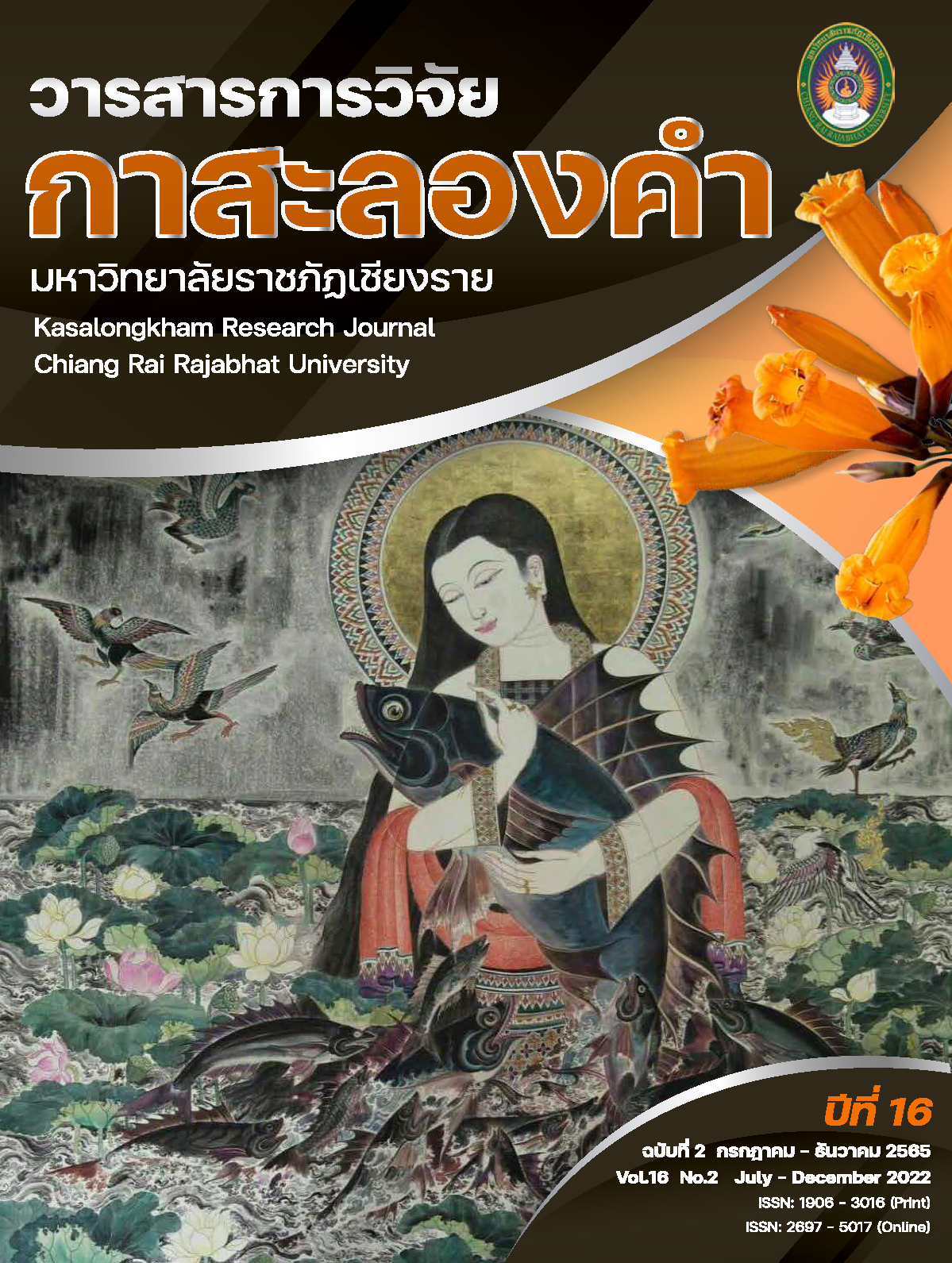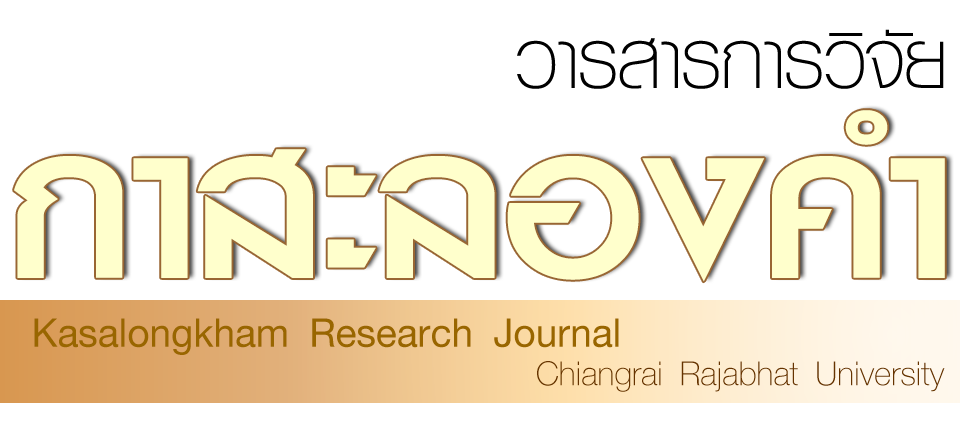การพัฒนาผลการเรียนรู้และทักษะการคิดวิเคราะห์ทางคณิตศาสตร์ โดยใช้ชุดกิจกรรมการเรียนรู้แบบร่วมมือร่วมกับการบูรณาการสิ่งแวดล้อม สำหรับนักเรียนชั้นมัธยมศึกษาปีที่ 2 สังกัดสำนักงานเขตพื้นที่การศึกษาประถมศึกษาเชียงใหม่ เขต 4
คำสำคัญ:
ชุดกิจกรรมการเรียนรู้ เรื่อง ทฤษฎีบทพีทาโกรัส, การเรียนรู้แบบร่วมมือ, การบูรณาการสิ่งแวดล้อม, ผลการเรียนรู้, ทักษะการคิดวิเคราะห์บทคัดย่อ
การวิจัยครั้งนี้มีวัตถุประสงค์เพื่อสร้างชุดกิจกรรมการเรียนรู้แบบร่วมมือร่วมกับการบูรณาการสิ่งแวดล้อม เรื่อง ทฤษฎีบทพีทาโกรัส ศึกษาผลการเรียนรู้และผลการพัฒนาทักษะการคิดวิเคราะห์ทางคณิตศาสตร์ เรื่อง ทฤษฎีบทพีทาโกรัส หลังการจัดการเรียนรู้โดยใช้ชุดกิจกรรมการเรียนรู้แบบร่วมมือร่วมกับการบูรณาการสิ่งแวดล้อม ของนักเรียนชั้นมัธยมศึกษาปีที่ 2 ผลการวิจัยพบว่า
- ชุดกิจกรรมการเรียนรู้แบบร่วมมือร่วมกับการบูรณาการสิ่งแวดล้อม เรื่อง ทฤษฎีบทพีทาโกรัส ได้แก่ ชุดที่ 1 สมบัติของรูปสามเหลี่ยมมุมฉาก ชุดที่ 2 ทฤษฎีบทพีทาโกรัส ชุดที่ 3 บทกลับของทฤษฎีบทพีทาโกรัส และชุดที่ 4 โจทย์ปัญหาและการนำไปใช้ มีประสิทธิภาพ เท่ากับ 77.54/78.51 โดยสูงกว่าเกณฑ์ที่กำหนดไว้ 75/75
- ผลการเรียนรู้ เรื่อง ทฤษฎีบทพีทาโกรัส ด้านความรู้ ความคิด ด้านการประยุกต์ใช้ และด้านการสังเคราะห์หลังเรียนสูงกว่าก่อนเรียน อย่างมีนัยสำคัญทางสถิติที่ระดับ 0.01 และผลการประเมินทักษะการเชื่อมโยง ทักษะการให้เหตุผล และทักษะการแก้ปัญหา หลังเรียนสูงกว่าก่อนเรียน อย่างมีนัยสำคัญทางสถิติที่ระดับ 0.01
- ผลการประเมินคุณลักษณะที่พึงประสงค์ทางคณิตศาสตร์ของนักเรียน ด้านความรอบคอบเกี่ยวกับ เนื้อหา วิธีการ/กระบวนการ และผลลัพธ์ ในภาพรวมนักเรียนอยู่ในระดับดี และการทดสอบสัดส่วน Z - test อยู่ในระดับดี สูงกว่าเกณฑ์ร้อยละ 60 ตามเกณฑ์ที่กำหนดอย่างมีนัยสำคัญทางสถิติที่ระดับ 0.05
- ผลการประเมินทักษะการคิดวิเคราะห์ทางคณิตศาสตร์ ด้านการคิดจำแนกแยกแยะ ด้านคิดเปรียบเทียบ ด้านเชื่อมโยมและด้านการแก้ปัญหา ในภาพรวมนักเรียนอยู่ในระดับดี และการทดสอบสัดส่วน Z - test อยู่ในระดับดี สูงกว่าเกณฑ์ร้อยละ 60 ตามเกณฑ์ที่กำหนดอย่างมีนัยสำคัญทางสถิติที่ระดับ 0.05
เอกสารอ้างอิง
Dechakupt, P. (2001). Student-centered teaching and learning concepts, methods and teaching
echniques 1. The Master Group Management.
Fakkao, S. (1996). The Development of Instructional Model Enhancing Five Minds for the Future for
Undergraduate Students at the Faculty of Undergraduate Students at the Faculty of Education,
Chandrakasem Rajabhat University. Rajabhat Maha Sarakham University Journal, 10(2), 59 – 66.
Hossain, A., & AhmadTarmizi, H. (2013). Effects of cooperative learning on students’
achievementand attitudes in secondary mathematics. Procedia -Social and Behavioral
Sciences, 93, 473 – 477. https://doi.org/10.1016/j.sbspro.2013.09.222
Institute for the Promotion of Teaching Science and Technology. (2007). Assessment
Assessment for Learning Quality and Exam Samples from the International Student
Assessment Project (PISA). Seven Printing Group.
Kawchaimaha, P. (2014). The Development of Mathematics Learning Activities Based on
Constructivist Learning Model and Polya’s Problem Solving Processes Emphasizing
Analytical Thinking Skills on Introduction to Real numbers for Mattayomsuksa 2.
[Master’s Thesis]. Khon Kaen University.
Khaemanee, T. (2009). Science of teaching, body of knowledge for effective learning process
management. Chulalongkorn University.
Leeprakhon, R. (2019) The Development of Learning Activities in ‘Problems Solving on
Addition, Subtraction, Multiplication, Division, and Their Mingle’ for the 3 rd Grade
Student by Using Cooperative Learning Management. [Master’s Thesis]. Rajabhat Maha
Sarakham University.
Ministry of Education. (2008). Basic Education Core Curriculum. Kurusapa Ladprao Publishing.
Pengsawat, W. (2003). Classroom research. Suweeriyasan.
Phothiwat, K. (1999). Behavior in teaching mathematics at elementary school level. Faculty of Education,
Surindra Rajabhat Institute.
Pramot, P. (2018). Development of mathematical learning activity packages by using cooperative learning
oupled with games to enhance learning outcome and desirable mathematical characteristics
for Prathomsuksa 5 students. [Master’s Thesis]. Chiang Mai Rajabhat University.
Rojanaburanon, W. (2014). A Development of Analytical Thinking Test for Mathayomsuksa 1-3
Students at Kasetsart University Laboratory School, Center for Educational Research
and Development. [master’s Thesis]. Kasetsart University.
Saplon, S. (2012). The development of learning outcomes and mathematical process skills of
the tenth grade students taught by integration of KWC technique and empowerment
approach. [Master’s Thesis]. Slipakorn University.
Singkham, N. (2018). Development of Mathematics Activity Through Cooperative Learning With
The Geometer’s Sketchpad (GSP) Program to Encourage Learning Achievement And
Creative Thinking For Mathayomsuksa 2 Students. [Master’s Thesis]. Chiang Mai Rajabhat University.
Sinthapanont, S., & Weerakiatsunthorn, J. (2013). Learning management for teachers in the
new era to the community. ASEAN. 9119 Technical Printing Limited Partnership.
Srathongniam, K. (2013). House of Little Scientists Lays the Foundation for Thai Children to
the Future. http://www. dailynews.co.th/Content.do?contentId=50718.
Susaorat, P. (2008). Thinking Development. Bangkok: 9119 Technique Printing.
Tanawadee, R. (2001). Provision of Integrated Learning Activities Based on Surrounding
Environment for Wat Suan Dok School Students. [Master’s Thesis]. Chiang Mai University.
Tran, Van Dat. (2014). The Effects of Cooperative Learning on the Academic Achievement
and Knowledge Retention. International Journal of Higher Education, 3(2), 131-140.
Yamgieb, S. (2015). A Development of Learning Packages by Using STAD Technique with
Metacognition Strategy to Enhance Mathematics Solution Ability on Ratio and
Percentage for Grade VIII Students. [Master’s Thesis]. Naresuan University.

ดาวน์โหลด
เผยแพร่แล้ว
รูปแบบการอ้างอิง
ฉบับ
ประเภทบทความ
สัญญาอนุญาต
ลิขสิทธิ์ (c) 2022 วารสารการวิจัยกาสะลองคำ มหาวิทยาลัยราชภัฏเชียงราย

อนุญาตภายใต้เงื่อนไข Creative Commons Attribution-NonCommercial-NoDerivatives 4.0 International License.





